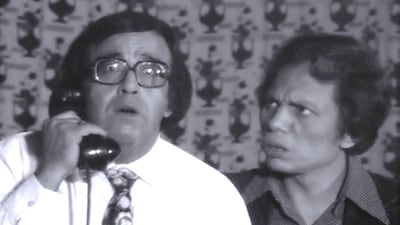What does a zany Egyptian theatrical production of Madraset El Moshaghbeen have to do with the annual Eid Al Fitr holidays? Nothing and everything at the same time.
Ever since the televised version of the play by Ali Salem made its premiere on Egyptian state television in 1971, the repeat showings have become a mainstay of the holiday season across regional broadcasters.
In 2021, the black-and-white production was streamed in colour after it was picked up by Netflix. The title is likely to creep, once again, up the streaming platform’s top 10 list as the holidays begin in earnest next week.
Set in the classroom of a Cairo high school, Madraset El Moshaghbeen (School of Mischief) features Egyptian comic stalwarts Adel Emam, Saeed Saleh and Younes Shalaby, as well as a young Ahmed Zaki and the seasoned Hassan Mostafa, who was on his way to becoming a star at the time. They play a group of troublesome students who can only be controlled through the unorthodox methods of new teacher Effat (played by Soheir El Bably).
The plot may sound familiar as it's partly inspired by the 1967 British film To Sir, with Love starring Sidney Poitier. The rebellious youth in Madraset El Moshaghbeen have largely given up, with some even failing to graduate school after more than a decade. Hence it is time to enlist Effat, who is stern yet enlightened.
Her methods, which focus on interactive activities and transforming the classroom into a forum where students can express themselves, reinvigorates the characters while also getting laughs at a cracking pace. Playing the ring leaders of the classroom, Emam, Shalaby and Saleh each bring distinctive approaches to their most memorable characters.
Iman is Bahgat, a student who is quick to offer both pithy insults to his teacher and surprisingly sage observations about social ills and moral disorder. Meanwhile, Saleh plays Morsi, a neurotic fireball with the kind of explosive temperament and sensitivity reminiscent of Seinfeld's George Costanza.
Classroom skirmishes serve as metaphors for greater issues beyond school life. It is this subtle commentary, skilfully arranged by acclaimed playwright and poet Salem, that allows Madraset El Moshaghbeen to be hailed as an influential and even important piece of Egyptian theatre.
Effat's people-centric approach as an educator can be viewed as a subtle reproach of outdated education systems of the time that prized conformity over building and celebrating individual strength. The students' rebellious nature and no-holds-barred conversations are a way for Salem to comment on the social inequality plaguing Arab society.
While the storyline is a standard trope for high school-based narratives, Madraset El Moshaghbeen succeeds because of its energy, symbolising the golden era of Egyptian theatre – a 30-year period that ended in the early 1980s.
It is this sense of nostalgia that helped propel the production to become an Eid staple. Its role as good-natured family entertainment helps it remain as such, alongside 1976’s Al Motazawegoon and 1979’s El Eyal Kebret. Its other themes of family and societal unity – as the play concludes with all conflicts resolved – also echoes one of Eid Al Fitr’s central messages of reconciliation.
More than five decades on, Madraset El Moshaghbeen remains timeless.


